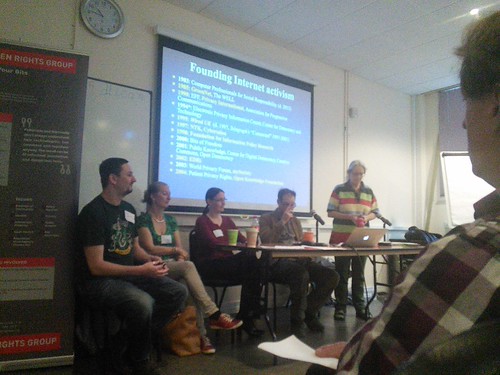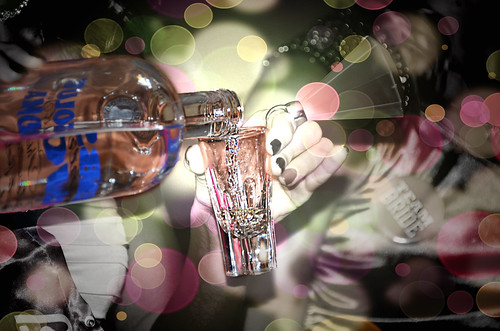OpenTech is a one day conference which I last attended back in 2006 I think. Now in its 10th year, its still a place for the tech focused culture to be heavily debated.
OpenTech has 3 tracks of talks from people who put themselves forward beforehand. I had thought about doing so but missed the deadline for expression of interest. I learned that I should have done so anyway, as quite a few people dropped out.
Regardless of the drop outs, the conference talk quality was high. Here’s the ones which really spoke volumes to me.

The Open Rights Group 10 years on…
I was always looking forward to this one, especially because it was 10 years since a bunch of smart people got together to discuss the idea of why there was no EFF for the UK. In that room somebody pledged to pay 5 pounds a month to something like the EFF. Others followed suit and with Suw Charman Anderson (whom I’ve not seen in ages) taking up the reins of what ever it was going to be. The Open rights group was born and fostered into the world.
It was great to step back through the history of the Open Rights Group and think about the next 10 years (my question). I had hoped Becky, Danny and Cory might have been there too but alas it was great to see everybody else.

Privacy: I do not think that word means what you think it means – Kat Matfield
This was enlightening talk in a string of talks about privacy. It was refreshing to have the view of everyday people on privacy. Especially the idea of peak page padlock aka security theatre, which she explained was a kind of dark pattern. She didn’t get a easy ride with the questioning afterwards about the sample size and how scientific the tests were but it didn’t matter, it was fascinating regardless.

The state of the network address – Bill Thompson
What can I say about Bills talk? Well it was great. So much was covered but I loved the idea of…
IP, therefore I connect
Human values in the technology was heavily discussed along with doing the right thing and building systems/frameworks to encourage the best of these values.
Bill outlined a couple scenarios which he uses to illustrate human values. Hearing them made it very clear whats at stake.
Use of personal data for children and young adults who are still finding there way, experimenting with their identity and learning what makes them tick. These years are hugely transformative and can be easily warped by requiring students to submit work through facebook or the rest of a religious family seeing recommendations for atheist documentary’s. Each thing is well meaning but damaging as a consequence.
I don’t know what my parents would have made of me taking out books from the library about drugs. I was curious and as a result learned so much about them that I pretty much embarrassed teachers and friends with my knowledge of drugs. I also never took them as a result of my knowledge. If this was 20yrs later and my parents were getting recommendations based on my book renting it would be a very different conversation!
Ethics and human values need to exist in the systems & algorithms we create. Its beyond a nice thing to do, its essential. Bill highlighted the conflict in the way most startups are funded. He pointed out public organisations like the BBC to develop new models for the public good.
Everything ran nicely into Gavin Starks talk which followed about the state of data and data as infrastructure.
Let’s redecentralize — Irina Bolychevski
I didn’t really recognise redecentralise till Irina started listing the sites which they had listed on there Github repo. At that moment I started thinking this sounds similar to something I blogged about a while ago... and I wasn’t wrong.

A mobile web of apps and documents – Adewale Oshineye
I think Adewale is great (no kick for the amount of times I have quoted him even). He thinks long and hard about subjects and I quite enjoy the challenging discussions we end up having when we have time. It was in the last session about decentralisation, that I even quoted him in my question to Irina.
People’s enthusiasm for federated decentralised $WHATEVER seems inversely proportional to the practicality of their plan for achieving it
It was great to hear Adewale on stage. I wasn’t quite sure where he was going at the very start of the talk, when he started asking what the web was but before long it all came clear when he revealed the slightly surprising fact that the biggest mobile user agent is Facebook. Aka people viewing the web through the Facebook app more than any other mobile device or app.
He then talked about Javascript only sites (ones which don’t even deliver a page unless you have JS enabled), apps containing URX’s, The Chrome and Safari tab feature. Pintrest got a bit of kicking for their aggressive stance to use their app over accessing by a browser or any other way.
But its the question Adewale left us which was the kicker….
Is this still the web?
A bit of a debate kicked off but unfortunately there wasn’t much time left to really get into it. However the question still remains and got me thinking, about what I hold dear about the web. Maybe I’m romanticising the history of the web? But I don’t think so… I honestly think theres something important about the open web through open platforms.
Thinking about it now, listening to Brian Chirls earlier in the week talk about WebVR starter kit and the things he did to make sure VR isn’t just for the rich elites but also for the children who might be able to afford a cheap android phone for VR viewing. But its not about consuming! They should be able to create their own VR, like when we used view source to understand how the web worked. Even on a super locked down library PC.
I know there is something essential about using accessing the web from a browser. It might be the shift from consumer to author but I haven’t quite condensed it down to a paragraph yet, I’m sure to tell Adewale when I next see him next.

dotEveryone by Paula Le Dieu
I was lucky that the order on the website stayed the same, as I left track 3 with Adewale on the top floor to catch Paula Le Dieu sitting on the stage. As I walked down to the front, she was talking about how things like the Open Rights Group and BBC Backstage were launched 10 years ago and most stood the test of time. I know Paula wasn’t singling me or anybody out (she later pointed out the BBC creative archive project was ended a few years previous to the end of BBC Backstage) I just happened to walk in right on cue. I wanted to clear things up anyway in my question. Some people later asked me what was BBC Backstage, which goes to show.
DotEveryone was a interguing talk and although not a lot was given away. Paula did mention 3 points of focus.
- Internet connectivity – Net neutrality?
- Diversity in Tech – There was a talk about being female on the internet earlier
- New Business models – Very fitting with Bills State of the internet address)
I’ll certainly be looking more into doteveryone.
It was a good conference and it was great having the ODI sponsoring and supporting it. Keep wondering if we could something similar in Manchester, especially with lots of people interested in the effect of tech culture.













